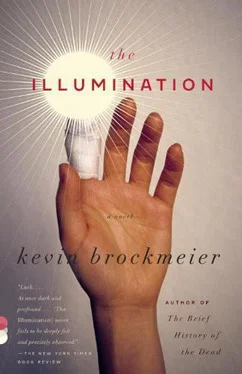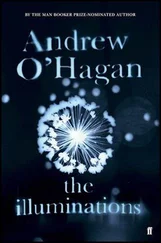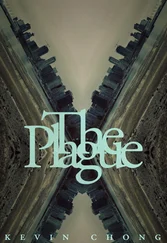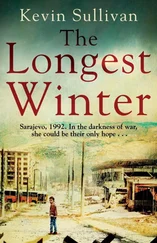The truth was that the thread connecting her to the world was as thin as could be. A sunrise here or there, the feel of suede against her skin, the aroma of strong coffee in the morning, and a few moments of forgetful well-being—that was it, that was all she had, and she knew that it could snap at any moment. She had always believed that one day someone would come along and love her and she would understand how to live. Maybe the idea was juvenile, but she had carried it with her all her life, like an ember smoldering in a pouch of green leaves. It was only the past awful year that had forced her to give it up. And now here it was again, the hope that she had finally found him, the man who would wrench her into the world, the good and beautiful world, where people got married and had children and slowly grew old together.
One afternoon, as she was standing at the kitchen counter eating a turkey-and-diced-olive sandwich, she realized that she had made up her mind. She swept the bread crumbs into her palm and brushed them gently, caressingly, into the sink, as if she were stroking a cat. Then she went outside and knelt at the edge of the crevice. Her neighbor was grilling a steak in his backyard. A forsythia bush rustled in the wind.
There she was, and then there she wasn’t, and two large, pale ants were exploring the impression her knees had left in the grass.
It was the last the world would see of her, or at least the last the sun would, the last the sky.
I am here to tell you what happened next.
In Phoenix the streets ran flat and straight, and the jacaranda blossoms made strange ghosts in the slipstreams of the cars, and even at seven, after the sun had set, when the hotel’s valet motioned one of the taxis over for her, the city was clothed with a lustrous violet sky that seemed to have the full force of the day shining inside it, and her driver asked her why she was in town, and, “No kidding. Have you ever read those Stainless Steel Rat books?” and, “Tempe Square, d’ya say?” and she kept flattening her tongue against the sleek patch where her sore had been, reassuring herself that it scarcely hurt anymore, though her tongue itself was already perforated where she had rasped it against her teeth, and it felt as if she were balancing a seed, a small bitter seed, on the tip, and she knew it would be only a day or two before the tiny pock spilled out of itself and ulcerated, but for tonight at least she was better, she was better, and the bookstore smelled of bread and coffee from the bakery next door, and there was something about the way the microphone dislocated her speech, taking her Annie Lennox contralto and the slightly too-long hiss she gave her s ’s and making them gigantic, directionless, that she was still unpracticed enough to find amusing, as if she were nothing but a voice, a big spectral voice, and she could lose herself in it, forgetting all the people who sat before her with their tics and abscesses, their blisters and swollen glands, the intestinal disorders that floated in their abdomens like foxfire, the conjunctivitis infections that made their eyes gleam and shimmer, gathered in their chairs between the podium and the horror shelves, and when she reached the end of the story, someone raised his hand and asked, “What’s wrong with your people?” and then, “Don’t mistake what I’m saying. I liked that. I really did. But you write these stories about characters who have great sectors of what one would ordinarily regard as the common human experience entirely unavailable to them. I mean, they don’t seem to realize it, but they do. I’m just trying to understand why,” and the only answer she could think to give was that she had spent the last four years doing exactly the same, trying to understand why, and then there arrived the usual questions about her favorite books and her writing schedule and her teaching philosophy and her cover designs, and after she was finished responding to them, when she had thanked the audience for attending and signed the bookstore’s stock, one of the managers gave her a T-shirt with the words FICTIONAL CHARACTER printed on the front, and the bandage on the inside of his arm held a single brilliant point of silver that reminded her of the picture on an old cathode ray tube, collapsing to a starlike remnant of itself as the power was switched off, and the arches along the back of the store were crowned with paintings of mountains and houses, and the gold pillars were washed in light and shadow, and she was getting ready to leave when there he came, him , striding past the magazine racks, giving her his funny, bashful, enthusiastic smile, and he said, “Two days, you told me. Well, it’s been two days. It took me almost that long to drive here. I was wondering if—” and she interrupted him by gripping his wrist and stroking it with her thumb, slowly lifting her hand free until her fingers were barely skimming the risen tips of the hairs, and she asked him if he would mind too much, too terribly much—“John. John-with-an- h Catau”—if he would mind driving her back to her hotel, and she wondered if she had lost her senses, but she felt only the slightest nettling of pressure on her lip, and all she had was this one night, and he only had to look at her to see her.
Soon after the woman went to join her fiancé, as the final sweltering days of summer came to a close, an unusual event took place. Late one night, while everyone was sleeping, something shifted beneath the brown pastures and the dry creek beds, and a hundred thousand fissures spread across the landscape, leading to a hundred thousand front doors. Shortly after the sun rose, in one house after another, the lights went on, and people showered and got dressed, and then they stepped outside to go to work. Earlier that week, a mass of clouds had been seen at the horizon, which meant that it was almost time for the rains to begin again, but this particular day had dawned hard and clear. The heat rang out like a coin. The grass twitched and straightened in the morning air. And the lawns—they were split down the center, and from every rift projected a sheet of paper:
I love that perfect little cluster of freckles on your wrist .
I love the way your hair curls when you work up a sweat .
I love how good you were to me when I got sick .
I love watching you sit at your desk, the sun shining on you through the philodendron leaves .
I love your many doomed attempts to give up caffeine .
Once there was a country where it rained for most of the year, and everyone resided underground, and no one was quite sure who was dead and who was living. But it did not matter because they were happy. And they were ever. And they were after.
It is enough that the arrows fit exactly in the wounds they have made.
—Franz Kafka

At first he was sure he had died. When the one with the shaved head gave him another blow to the midriff and his stomach erupted with four long shears of light, he believed he was watching his soul flee from his body. He had never been certain he had a soul, but there it went, like a flock of birds flooding through an open gate. Out it poured from the gash on his arm. Out it poured from the puncture on his thigh. Out it poured from that frog’s neck of tissue between his thumb and his forefinger, where the one with the ski jacket had nicked him with a paring knife and forced him to splay his hand open until the skin split to the muscle. So much light. What else could it have been?
Then he noticed that the one who had caught him below the knee with the tire iron was glowing from his front tooth. And the one with the shaved head was examining the scuff marks on his knuckles, foiled with drops of blood. And the smaller one, the talker, who had started things off by pushing him against the wall and saying, “Where are they, huh? Where did you hide them, buddy?” was swiping at a glinting bruise on his arm, eyeing it with aggravation and curiosity, like a cat batting at a laser pointer.
Читать дальше













